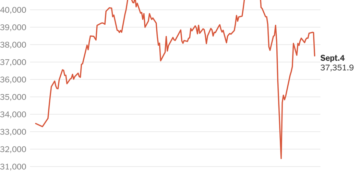A market tumble that began in the United States continued across Asia and Europe on Wednesday as concerns about the global economy and major technology companies spread among investors.
The benchmark indexes in Japan and Taiwan dropped more than 4 percent. South Korea’s Kospi index fell 3 percent and stocks in Shanghai and Shenzen also dipped.
Early trading in Europe followed a similar pattern, with the Stoxx 600, which tracks shares across the continent, down 1 percent.
The declines were largely influenced by a sell-off in tech companies in the United States on Tuesday. Shares of the semiconductor giant Nvidia plummeted 9.5 percent and dragged the technology-heavy Nasdaq down more than 3 percent.
The reaction in global markets shows that investors are still jittery weeks after the market meltdown in early August, when fears about a slowdown in the U.S. economy snowballed into a global rout.
A series of economic data points since then has eased concerns about a potential recession in the United States, and stocks had rebounded sharply in recent weeks.
That rise ruptured on Tuesday.
Oil prices also fell sharply, reflecting broader unease about the global economy. Brent crude, the international benchmark, dropped nearly 4 percent to just over $73 a barrel on Tuesday, its lowest point of the year.
The sell-off predominantly affected technology and semiconductor stocks, mirroring the declines seen in major U.S. tech companies such as Nvidia.
The Japanese chip equipment maker Tokyo Electron fell more than 8 percent on Wednesday, while the technology investor SoftBank was down nearly 8 percent. Taiwan Semiconductor Manufacturing Company and ASML, a Dutch manufacturer of chip-making equipment, saw declines of more than 5 percent.
In a report this week, analysts at the Bank of America said it expected the global economy to grow 3.1 percent this year, an only slightly slower pace than it had earlier predicted. The bank said it expected the United States to avoid a recession but took a less positive view of China, downgrading its growth estimate and calling government policies insufficient to stimulate demand.
Investors in the United States and elsewhere are awaiting the U.S. Labor Department’s August jobs report, scheduled for release on Friday.
Anticipation of that report has reignited concerns about a potential slowdown in the U.S. economy. It could also provide clues about how aggressive the Federal Reserve will be in its expected interest rate cut later this month.
The post U.S. Market Slump Fuels Global Sell-Off appeared first on New York Times.


















